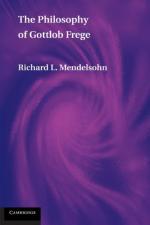|
This section contains 8,695 words (approx. 29 pages at 300 words per page) |

|
Life
After studying mathematics, physics, chemistry, and philosophy at the universities of Jena and Göttingen, the German mathematician, logician, and philosopher Gottlob Frege obtained his mathematical doctorate in Göttingen (1873) and his mathematical habilitation in Jena (1874). From 1874 to 1879 he taught mathematics at the University of Jena as a lecturer; in 1879 he was promoted to adjunct professor, and in 1896 to associate professor. Frege never obtained a full professorship. He retired from teaching in 1917 because of illness, becoming emeritus in 1918.
While he received little professional recognition during his lifetime, Frege is widely regarded in the early twenty-first century as the greatest logician since Aristotle, one of the most profound philosophers of mathematics of all times, and a principal progenitor of analytic philosophy. His writing exhibits a level of rigor and precision that was not reached by other logicians until well after Frege's death.
Main Works
|
This section contains 8,695 words (approx. 29 pages at 300 words per page) |

|


